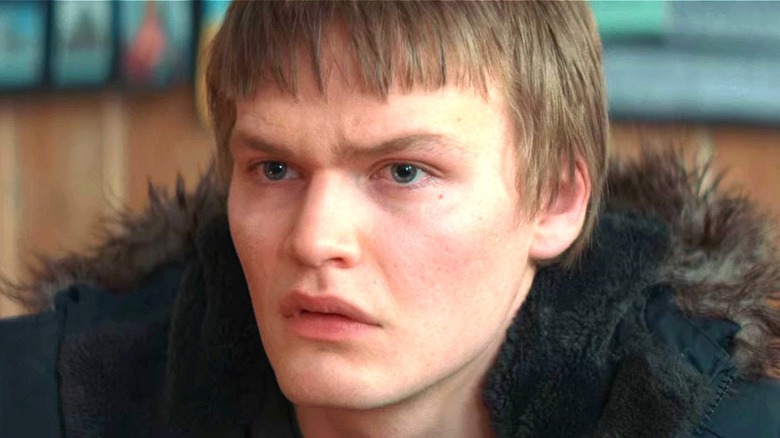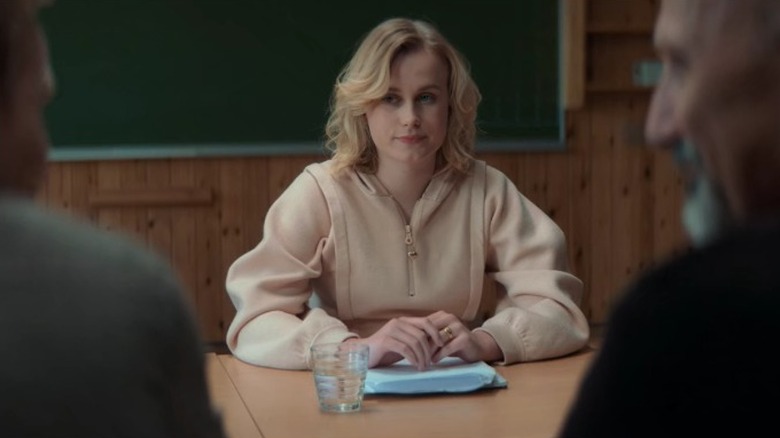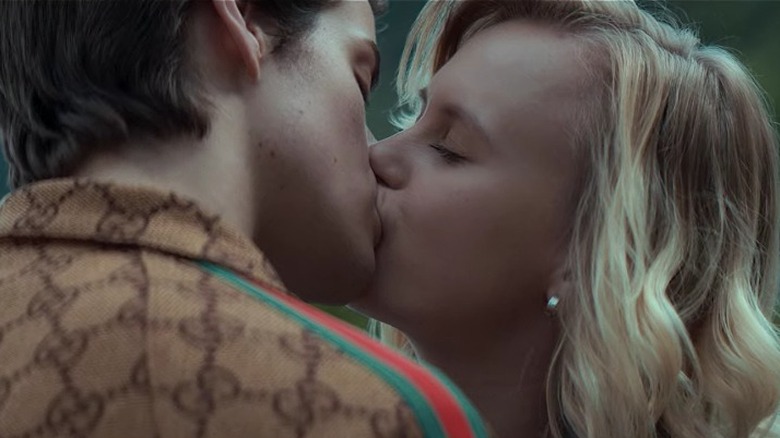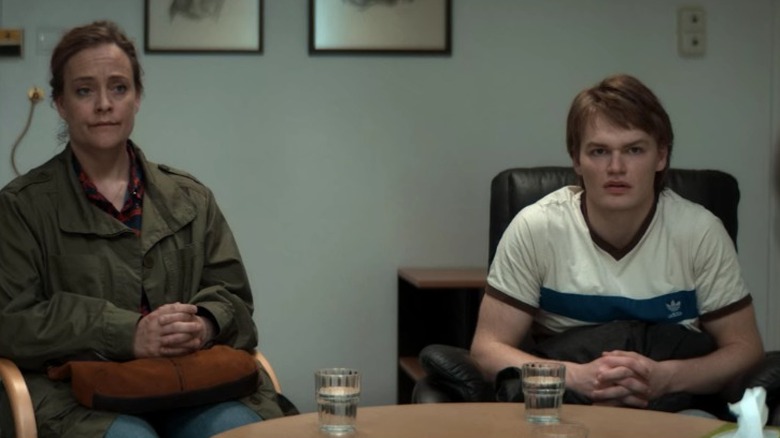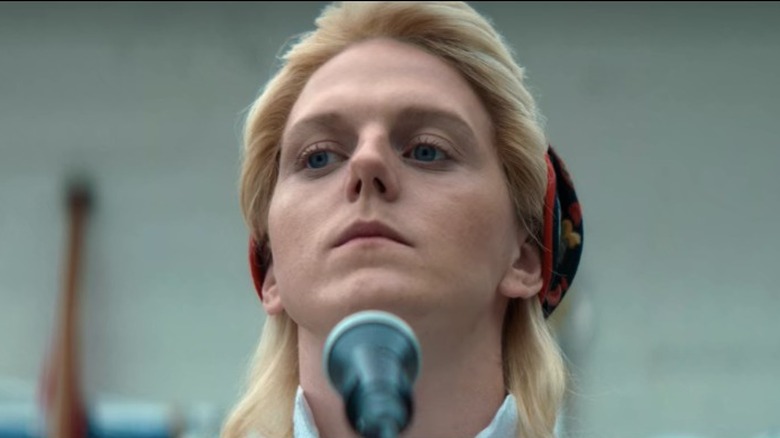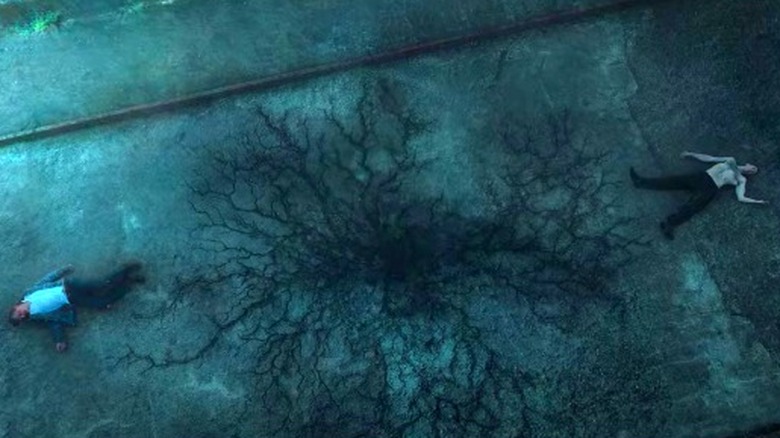The Ending Of Ragnarok Season 1 Explained
With Season 3 of Emilie Lebech Kaae's and Adam Price's "Ragnarok" now officially confirmed by Netflix, fans are more eager than ever to see the modern day take on Norse mythology make its return to the streaming service. The series — which reunited "SKAM" stars Herman Tømmeraas and David Stakston — debuted its inaugural six-episode season in January of 2020, and its sophomore season in the spring of 2021. Blending real-world issues such as environmental destruction, gender identity, mental health, and class and economic struggles with the epic narratives of ancient mythology, the series gained a devoted following in relatively short order. Its depiction of the Norse myths also signaled a return to the roots of its source material, offering an alternative depiction to the superhero battles of Thor and Loki in the MCU.
Like the Prose and Poetic Eddas from which it takes its cue, "Ragnarok" grounds stories of epic battles, fearsome monsters, and courageous deeds in the timeless struggles of everyday life and families, and explores the humanity hidden in these tales of adventure and adversity. Nowhere is this balancing act and investigation more apparent than in its Season 1 finale, which sees its protagonists and antagonists alike confront the realities, limitations, and interpersonal and global conflicts each must face.
Ragnarok's season 1 finale sets up the series' major conflict
One of the many reasons "Ragnarok" struck such a chord with viewers was that it managed to take an unflinching look at some of the real-world problems facing not just Norway, but the entire planet. By positing Norse mythology's armageddon lore (Ragnarök) as the result of irreversible environmental damage, the series was able to pull the epic narrative into an all-too-relevant context. Ragnarök isn't just a big, scary, ancient myth, the series suggests, but a reality humanity will inevitably face unless serious changes are made. The series' "Frost Giants" who own Jutul Industries are actual Frost Giants in the guise of humans, but also giants of capitalism and Industry.
In episode 6, Gry (Emma Bones) delivers her final paper to two instructors who fail to comprehend her overtly cutting and sardonic tone. Though Gry's paper reads like a Bureau of Commerce brochure for her hometown of Edda, Norway, it's actually a tongue-in-cheek critique of the naive assumption that Norway is "above" or removed from the environmental destruction that plagues many other countries. "It was all irony," she says, "everyone knows that it isn't like this in Edda. We have pollution, ice melting, people lie sick at home, but nobody talks about that .. .Edda is exactly like so many other Norwegian towns. We're all completely dependent on one ****** factory." That factory, Jutul Industries, is not only poisoning the town's drinking water, but has made the citizens so dependent on it for work, economic stability, and resources that it's become impossible to challenge its system. Gry reveals her final paper's meaning knowing it could prevent her from graduating, and the scene both illustrates the non-God's courage and sets up the series' underlying conflict.
In Season 1, episode 6, love makes a villain vulnerable
Though secret Jotunn Fjor (Tømmeraas) comes off as one of the show's most manipulative antagonists for several episodes in Season 1, the finale represents a major shift for the dynamic character — one that echoes Norse mythology's understanding of its villains as conflicted, never quite "purely evil" beings. Just like the Frost Giants (or Jotunn) of the series' ancient source materials, Fjor is capable of falling in love, despite his best attempts to avoid it. In the finale, we see Fjor struggle to choose between his love for the human Gry and his centuries-old loyalty to his fellow Giants.
When Jutul Industries refuses to cover Gry's father's cancer treatment (despite being the cause of his illness), Fjor makes an earnest but misguided gesture that teaches him something about the creatures to whom his family believes he's grown too close. Fjor tries to hand $250k cash to Gry's father, not understanding how insulting and hurtful his well-meaning gift is for the struggling, working class father. When Gry attempts to explain it to him, what follows is an important conversation about human dignity that causes Fjor to admire the creatures he's hitherto seen as, essentially, pathetic in their mortality. "But you're so fragile," he tells Gry. "You get old and sick and you die." Fjor is baffled by the human will to persevere despite these limitations, and it compounds the already shaky hold his fellow Giants have over him. "I don't want to be perfect," Fjor says to Gry, "I want to be a good person, just like you. Can you teach me?" Later, when forced to demonstrate his loyalty to his family, he's unable to kill the woman he loves — an important inhibition that lays the groundwork for his Season 2 transition.
Ragnarok's Season 1 finale dealt with a timeless fear and frustration
In addition to dealing with the very real, very relevant issue of climate change and environmental ruination, the season finale of "Ragnarok" touches on depression and mental health. Though it's Magne (Stakston) who's forced to see a psychologist (for his "delusions of grandeur" that the audience knows aren't delusional at all), in the episode's early scenes, Magne becomes concerned when his widowed, single mother Turid (Henriette Steenstrup) begins spiraling into a depression as she struggles to cope with the chaos around her while trying to make ends meet and protect her two sons. At one point, Magne has to call in to work for his mother, who hasn't left the couch in days.
The episode signals toward some of the psychology behind why humans create and tell guiding myths and stories in the first place, and it is at once a gripping reminder of the importance of mental health support and a glimpse into some of our deepest-rooted fears as sentient beings. The fear of not being believed, of being perceived as "crazy" for refusing to feign saneness in an insane world is a theme we see again and again in stories of tragic heroes such as Magne (see: the Greek myth of Cassandra, "American Horror Story: Asylum," or even "Law & Order: SVU").
As a plot device, it further adds to the uphill battle faced by Magne, who becomes uncertain of his own convictions after being diagnosed as a paranoid schizophrenic and seeing the impact his actions are having on his mother. As a thematic device, it adds yet another contemporary layer to the centuries-old mythology around which the series' revolves.
Episode 6's ironic title hammered home an important tension
Irony abounds in the Season 1 finale of "Ragnarok." Laurits delivers his speech whilst dressed as (and impersonating), Principal Ran Jutul (Synnøve Macody Lund). On the one hand, his performance is yet another hint that Laurits is none other than the reincarnation of the God of Mischief, Loki. On the other, it illustrates his not-always-certain loyalty to his own family, despite his ongoing fascination with and attraction to the Jutuls. Lastly, the scene is another demonstration of Laurits' exploration of his own identity — be it the exploration of his gender and sexuality, or his confusion over why he doesn't quite fit in with his brother and mother (spoiler alert: it's because, like Loki, his father is actually a Frost Giant).
Laurits' speech echoes much of what Gry's paper explores. "I also love our fine Norwegian democracy," he says, "even though people don't actually have a say in anything, it's nice that they think that they do...people talk about pollution, but who cares? That is what makes Norway one of the world's richest countries." Not only is the line relevant to the in-world tensions of the series, it's also an important critique of Norway's booming oil industry and the impact it has on the lives of its citizens and the globe. Although, as Lonely Planet reports, "100% of Norway's electricity supplies come from renewable" resources, studies suggest that "emissions from the country's oil exports will exceed Norway's domestic emission by 1000%," and that the ostensible "model" for environmental health is "committed to, and dependent on, fossil fuels..." Given the show's own commitment to exploring this contradiction, Laurits' final line is a chilling prophecy and summation of the series' titular event: "Who," he asks, "do you think will be the last ones to drown when all the ice has melted? We...will live on top of the world."
Magne and Vidar's face-off left big questions for Season 2
Although the first five episodes of Season 1 of "Ragnarok" never fully confirm Magne's status as a God reincarnated, it's safe to say all the signs are there. Episode 6's epic show down between Magne and Jutul patriarch Vidar (Gísli Örn Garðarsson) both confirms his ability to conjure lightning (pretty big red flag if you're wondering whether or not you're a God) and leaves the audience with important questions for Season 2.
Though most of Season 1 hints at Magne as a reincarnation of the god Thor, his name, his battle with Vidar, and the seer Wenche's (Eli Anne Linnestad's) voiceover that follows point to a different identity entirely. Following his lightning-laced, superhuman stand-off with Vidar (wherein Vidar references Magne's long-deceased father), Wenche is heard saying, "many believe that Ragnarök was the end. They are wrong. It's where it all begins." In Norse mythology, Ragnarök is a kind of ending (it means "Death of the Gods"), but it is also a beginning — the destruction of the Old Gods and the Old World before the rebirth of a new one. Although Thor is killed by the serpent Jörmungandr at the battle of Ragnarök, his son, Magni (hard to miss the name's likeness to "Magne") survives. Both Magni and his brother Modi are said to "inherit Thor's hammer Mjölnir after Ragnarök" (via Skjalden). Given the onslaught of evidence suggested by Magne's and Vidar's confrontation, it's quite possible that Magne isn't Thor at all, but the God's lesser-known progeny who helps usher in the new world in the wake of Ragnarök's devastation.
